仁爱版七年级英语下册单元话题知识点归纳(七)
(完整版)仁爱七年级下Unit7知识点总结.doc

Unit 7Topic11.Happy Birthday! 生日快!2.take photos 拍照3.work out 作出,解决4.how about/what about 如何,怎5.fly kites 放筝6.row a boat 划船7.perform ballet ] 表演芭蕾舞8.dance the disco 跳迪斯科9.make model planes 做机模型10.draw pictures 画画11.show sb. sth.某人看某物12.two years ago 两年前13.be in hospital (生病)住院二、句型 :1.What are you going to perform at Kangkang’ s birthday你打party?算在康康的生日晚会上表演什么?“be going to+ 原形”的句型常用来表示打算、准做某事或即将生或肯定要生某事, be 是助,有人称和数的化,如:He is going to have a swim this afternoon.2.What about /How about + 名、代或名,意“⋯⋯怎么?”常用来表示⋯⋯的看法,或表示建、的方式,如:How/What about sitting here to look at the moon? 坐在儿月怎么?3.I only can sing English songs. 我只会唱英文歌曲。
(情can 的用法)They couldn’ t sing any English songs two years ago两年.前他不会唱英文歌曲。
一段 +ago:表示在⋯⋯以前,如:three months ago 三个月以前4.What will you buy for Kangkang as a birthday present?你要康康什么礼物?“will+ 原形”表将来。
仁爱版七年级下册英语7~8单元知识点总结

仁爱版七年级下册英语7~8单元知识点总结Unit 7 Topic 1重点句型—Were you born inHebei?Yes, I was./ No, I wasn’t.—When was your daughter born?—She was born on October 22nd, 1996.—Whenis your birthday? May 13th—What sthe shape of your present?It’s acircle./ rectangle / triangle/square.—What’sit like ? It’s like a star.—Howlong/wide is it?—Whatdo we use it for?We use it to study English.重点词组及短语talk about 谈论place of birth 出生地date of birth 出生日期after class 下课big fan 狂热粉丝have a birthday party 举行生日聚会have a look 看make a cake 做蛋糕do some cleaning 打扫cook a big dinner 做一顿丰盛的晚餐重点讲解1 英语中日期可以有两种表达法:(1)月日,年。
May 1st,2008(2)日月,年。
1stMay,20082 plan to do sth.计划做某事3 基数词变序数词的规律:基变序,有规律;一、二、三,特殊记;从四起,th; 八去t来九去e; ve要用f替。
整十该y为ie,后面再跟th;几十几和几百几,只变个位就可以。
4 介词in,on, at 在时间前面的应用1)在上下午、傍晚用inin the morningin the afternoonin the evening2)在季节、年、月前用in,inspring/summer/fall/winterin 2002, inJuly, in February, 20013)在具体的某一天及某一天的上下午、晚上用on 。
仁爱英语七年级下unit7知识要点

七年级下U7 The Birthday PartyTopic1 When is your birthday?一﹑单元重点:1.学习be动词的过去式was, were。
2.学习月份的词并掌握日期的表达方式。
3.学会使用表示时间的介词in, on, at。
4.基数词与序数词的用法。
5.学习日期的表达和读法及如何询问日期.What’s the date?6.描述事物的形状﹑尺寸和用途等。
7.句型It’s +数词+long/wide/tall等。
8.句型buy sth. for sb.二﹑词与词组:1.talk about谈论2.know about了解3.the rest 其余4.plan to do sth.计划做…5.have a party举行晚会6.be born 出生7.a model plane模型飞机8.how long 多长9.buy sth. for sb.买…给…=buy sb. sth10.a surprise一个惊喜11.do some cleaning打扫卫生12.a big fan of …的超级粉丝(…迷)13.sports star体育明星14. be like像…15.月份:(注:月份的首字母要大写)16.表示形状的词:三﹑重要句型:1. What’s the date today? It’s may 8.2. What’s the shape of your present? It’s round.3. What shape is it? It’s rectangle.4. How long(长)/wide(宽)/tall(身高)/high(高度)/deep(深)+is it?5. What do we use it for? We use it to study English.6.It must be an English learning machine.7.Here is a present for you.四﹑语法:一般过去式(past simple)表示过去某个时间发生的动作或存在的状态,常与yesterday/last year/just now/in 1990/in those days/a few days ago/two weeks ago 等表示过去的时间状语连用;一般过去式也表示过去经常或反复发生的动作,如:1. When were you born? I was born in June,19702. Were you born in India? Yes,I was, No,I wasn’t.3. Where was she born? She was born in America.4. When was your daughter born? She was born on October 22nd 1996.五﹑重要知识点:时间介词in/on/at用法介词in/on/at可以用于表示时间的名词前,有“在”的意思,用法如下:1)at用于钟点时刻前,意思为“在--- 时(刻)”,如at three O’clockat a quarter to six at noon at nightat midnight at this time of day2)in 用于泛指一天的上午,下午,晚上等,也用于某个较长的时间,如年,月,季节等,如:in the morning/afternoon/evening in 2003, in theday/daytime.In还可以表示“从现在起一段时间以后”in a week3)on用于表示在具体的某一天以及某天的某段时间,如:on Sunday /on Children’s day /on the night of new year,on the morning/afternoon/evening of /on Sunday morningTopic2 Can you sing an English song?一﹑单元重点:1.掌握情态动词can/can’t及其过去式could/couldn’t的用法。
仁爱版七年级下册-unit7核心考点归纳

仁爱版七年级下册unit7核心考点归纳【核心词汇】1.afraidafraid是形容词,意为“害怕的,恐惧的”。
常和系动词一起构成系表结构。
句式be afraid是afraid最常用的形式,其常见的用法有:(1)be afraid ofbe afraid of后跟名词、代词或动名词,意为“害怕某人或某物”。
例如:Are you afraid of dogs?你害怕狗吗?She seems very much afraid of him.她好像很害怕他。
He is afraid of j umping.他不敢跳。
(2)be afraid tobe afraid to后接动词原形,意为“害怕做某事或不敢做某事”。
例如:He is afraid to fly in a plane.他不敢坐飞机。
2.ago&before(1)ago表示“从现在起的若干时间以前”,意思是“距今......以前”,需和过去时或过去进行时连用。
before泛指“从过去起的若干时间以前”,意思是“距过去某时以前”,常和完成时连用,尤其在间接引语中,例如:His parents died ten years ago.他父母十年前都去世了。
He said that his parents had died ten years before.他说他父母亲十年前都去世了。
I have never been there before.我以前从来没有去过那里。
(2)如果不具体表明多少时间以前,只用before不用ago,意为“从前、以前”。
before仍以副词的形式置于被修饰语后,常与完成时或者过去时连用。
例如:Have you seen this film before?你以前看过这部电影吗?He asked me whether I had been to the Great Wall before.他问我以前是否去过长城。
(3)表示在某一点时间或事件以前时,只用before不用ago,这种用法是将before 当作介词或连词使用。
仁爱初一(下册 )Unit 7 --topic 1 重点总结
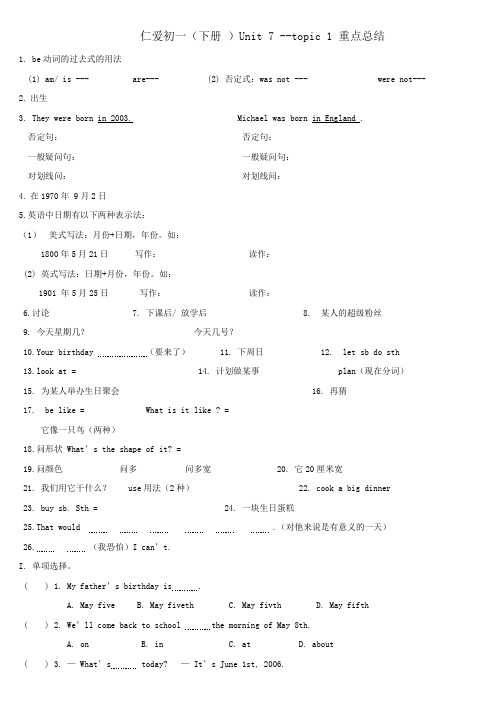
仁爱初一(下册)Unit 7 --topic 1 重点总结1. be动词的过去式的用法(1) am/ is --- are---(2) 否定式:was not --- were not---2.出生3. They were born in 2003. Michael was born in England .否定句:否定句:一般疑问句:一般疑问句:对划线问:对划线问:4.在1970年 9月2日5.英语中日期有以下两种表示法:(1)美式写法:月份+日期,年份。
如:1800年5月21日写作:读作:(2)英式写法:日期+月份,年份。
如:1901 年5月25日写作:读作:6.讨论7. 下课后/ 放学后8. 某人的超级粉丝9. 今天星期几?今天几号?10.Your birthday (要来了) 11. 下周日 12. let sb do sth13.look at = 14. 计划做某事 plan(现在分词)15. 为某人举办生日聚会 16. 再猜17. be like = What is it like ? =它像一只鸟(两种)18.问形状 What’s the shape of it? =19.问颜色问多问多宽 20. 它20厘米宽21.我们用它干什么? use用法(2种) 22. cook a big dinner 23. buy sb. Sth = 24. 一块生日蛋糕25.That would .(对他来说是有意义的一天)26. (我恐怕)I can’t.I. 单项选择。
( ) 1. My father’s birthday is.A. May fiveB. May fivethC. May fivthD. May fifth( ) 2. We’ll come back to school the morning of May 8th.A. onB. inC. atD. about( ) 3. — What’s today?— It’s June 1st, 2006.A. dayB. dateC. the dateD. the day( )5. We are planning for a picnic this Sunday.A. goB. to goC. goesD. going( ) 7. Tomorrow is birthday.A. Mary mother’sB. Mary’s motherC. Mary’s mother’sD. Mary mother( ) 9. My father is 172 centimeters.A. longB. tallC. heavyD. wide ( ) 10. — How is the computer?— It’s 40 kilos.A. heavyB. farC. oldD. bigII. 汉译英。
七年级下册英语unit7仁爱版知识点

七年级下册英语unit7仁爱版知识点Unit 7主要介绍了购物和做家务的相关语言知识。
以下是本单元的重点知识:
一、购物语言
1.询问价格和折扣:
- How much is it?(这个多少钱?)
- Is it on sale?(打折吗?)
- What's the discount?(有多少折扣?)
2.询问购物需求:
- Can I help you?(需要帮忙吗?)
- What size/color do you need?(你需要什么尺码/颜色?)
- What do you want to buy?(你想买什么?)
3.支付和找零:
- How do you want to pay?(你想用什么方式支付?)- Here's your change.(这是找给您的钱)
二、家务语言
1. 做家务的动词:
- sweep(扫地)
- mop(拖地)
- vacuum(吸尘)
- wipe(擦拭)
- dust(擦灰尘)
- clean(清洁)
- wash(洗)
- iron(熨烫)
2. 做家务的时间:
- on weekends(在周末)
- in the morning(早上)
- after school/work(放学/下班后)
- before bedtime(睡觉前)
3. 表示强调的副词:
- really(真的)
- very(非常)
- extremely(极其)
以上是本单元的重点知识,掌握上述语言知识可以帮助你更好地与他人交流。
希望你能够认真学习,在日常生活中灵活运用。
仁爱版七年级英语下册单元话题知识点归纳(七)

Unit 7 Topic 1一、重点词汇和短语二、语言点Section A1.When was she born,…?他什么时候出生的,……?当表达某人出生于某时或某地时,用一般过去时was/ were born。
如:Where were you born? 你在哪儿出生的?2. she was born in July, 1965 .她出生于1965年7月。
在具体的某日前,用介词on;在月份或年份前用介词in。
如:on April 1st, 2005 在2005年4月1日in June, 1970 在1970年6月in 2004 在2004年3.年份的读法:Section B1.When is your birthday, Kangkang? 本句中的when是特殊疑问句,表示“什么时候”,有时相当于what time.但是when的适用范围较广,可以对年月日,几时几分等进行提问;而what time常对具体的几点几分进行提问。
When do you want to go to Beijing?你想什么时候去北京? What time do you usually go to bed?你通常什么时候(指几点钟)睡觉?2. —What’s the date today? 今天是几号?—It’s May 8th. 5月8日。
What’s the date today?是询问日期的句型3. How do you plan to celebrate it?你打算怎样庆祝?plan to do sth.打算做某事4.My friends want to have birthday party for me.have a birthday party举办生日聚会5.基数词变序数词的规律1, 2, 3 要牢记, 结尾各是t,d,d;8去t,9去e; ve要用f 替;然后再加th;整十变化需注意,ty变成tie, 后面再加th;假设遇到“几十几”,只变个位就可以Section C1. …what’s the shape of your present? 你的礼物是什么形状?对物体的形状提问常用句型“What’s the shape of…?”What’s the shape of`····?= What shape is ·····?2.—What color is it?它是什么颜色?—It’s black and white.是黑白相间的对物体的颜色提问常用句型:What color ·····?3. Oh! I get it. I get it. 我猜到了。
七年级下册仁爱英语unit7知识点

七年级下册仁爱英语unit7知识点Unit7的主要学习内容是介绍家庭成员和家庭生活,学生需要掌握以下知识点。
1. 家庭成员的称呼在英语中,不同的家庭成员有不同的称呼,例如:Father 父亲Mother 母亲Brother 兄弟Sister 姐妹Grandfather 祖父Grandmother 祖母Uncle 叔叔Aunt 姑妈/阿姨Cousin 堂表兄弟姐妹2. 家庭成员的介绍在介绍家庭成员时,可以使用以下句型:This is my father. 这是我的爸爸。
She is my mother. 她是我的妈妈。
He is my older brother. 他是我的哥哥。
She is my younger sister. 她是我的妹妹。
These are my grandparents. 这些是我的祖父母。
He is my uncle. 他是我的叔叔。
She is my aunt. 她是我的姑妈/阿姨。
He is my cousin. 他是我的表兄弟/表姐妹。
3. 家庭成员的特点在描述家庭成员时,可以使用以下句型:My father is tall and handsome. 我的爸爸高大英俊。
My mother is kind and beautiful. 我的妈妈善良美丽。
My brother is smart and funny. 我的哥哥聪明幽默。
My sister is friendly and creative. 我的妹妹友好有创意。
My grandparents are wise and caring. 我的祖父母睿智有爱心。
My uncle is energetic and adventurous. 我的叔叔充满活力和冒险精神。
My aunt is gentle and patient. 我的姑妈/阿姨温柔耐心。
My cousin is talented and outgoing. 我的表兄弟/表姐妹有才华且外向。
仁爱版英语七年级下册unit7重难点知识归纳总结
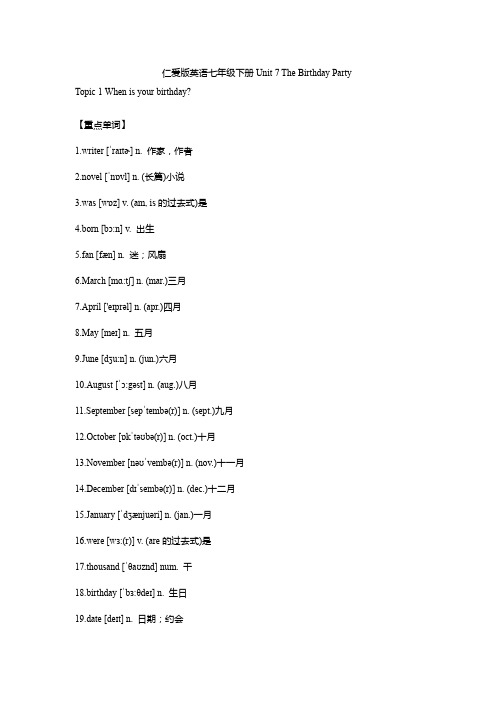
仁爱版英语七年级下册Unit 7 The Birthday Party Topic 1 When is your birthday?【重点单词】1.writer [ˈraɪtɚ] n. 作家,作者2.novel [ˈnɒvl] n. (长篇)小说3.was [wɒz] v. (am, is的过去式)是4.born [bɔ:n] v. 出生5.fan [fæn] n. 迷;风扇6.March [mɑ:tʃ] n. (mar.)三月7.April ['eɪprəl] n. (apr.)四月8.May [meɪ] n. 五月9.June [dʒu:n] n. (jun.)六月10.August [ˈɔ:gəst] n. (aug.)八月11.September [sepˈtembə(r)] n. (sept.)九月12.October [ɒkˈtəʊbə(r)] n. (oct.)十月13.November [nəʊˈvembə(r)] n. (nov.)十一月14.December [dɪˈsembə(r)] n. (dec.)十二月15.January [ˈdʒænjuəri] n. (jan.)一月16.were [wɜ:(r)] v. (are的过去式)是17.thousand [ˈθaʊznd] num. 千18.birthday [ˈbɜ:θdeɪ] n. 生日19.date [deɪt] n. 日期;约会20.calendar [ˈkælɪndə(r)] n. 日历21.plan [plæn] v. &n. 计划,打算22.celebrate ['selɪbreɪt] v. 庆祝23.party ['pɑ:tɪ] n. 聚会,宴会;党派24.fourth [fɔ:θ] num. 第四25.fifth [fɪfθ] num. 第五26.sixth [sɪksθ] num. 第六27.seventh ['sevnθ] num. 第七28.eighth [eɪtθ] num. 第八29.ninth [naɪnθ] num. 第九30.tenth [tenθ] num. 第十31.eleventh [ɪ'levnθ] num. 第十一32.twelfth [twelfθ] num. 第十二33.twentieth ['twentɪəθ] num. 第二十34.present ['preznt] n. 礼物35.shape [ʃeɪp] n. 形状v. 使成为……形状36.ball [bɔ:l] n. 球;舞会37.afraid [əˈfreɪd] adj. 担心;害怕38.star [stɑ:(r)] n. 星;明星39.mouse [maʊs] n. 老鼠40.square [skweə(r)] n. 正方形;广场;平方adj. 正方形的41.circle ['sɜ:kl] n. 圈,圆圈v. 圈出42.triangle ['traɪæŋɡl] n. 三角形43.rectangle [ˈrektæŋgl] n. 长方形;矩形44.oval ['əʊvl] n. 椭圆adj. 椭圆形的45.centimeter ['sentɪˌmi:tə] n. (cm)厘米46.Mrs. [ˈmɪsɪz] n. 太太,夫人47.cake [keɪk] n. 蛋糕【重点短语】1.be born 出生2.look at 看3.plan to do sth. 计划做某事4.have a birthday party 举办生日聚会5.the shape of ……的形状6.be like 像……7.how long 多长8.how wide 多宽e ... for ... 用……做……【重点句型】1.—When were you / was he/she born?你/他/她是什么时候出生的?—I/He/She was born on/in …我/他/她出生于……2.—Where were you / was he/she born?你/他/她在哪里出生的?—I/He/She was born in …我/他/她出生在……3.—When is your birthday?你的生日是什么时候?—May 13th.5月13号。
仁爱英语七下unit7知识点

Unit 7 topic 1 知识点一、重要词组1、他最喜爱的体育明星his favorite sports star2、了解某人know about sb3、某人的超级粉丝 a big fan of sb4、计划做某事plan to do sth5、举办生日聚会have a birthday party6、在1997年5月13日on May 13th,19977、像be like8、刚才just now / a moment ago9、多宽how wide10、多长how long11、一定是must be12、用某物做某事use sth to do sth13、用某物做某事use sth for doing sth14、用某物做某事use sth for sth15、做一顿特殊的饭have a special dinner16、为某人买某物buy sth for sb17、给某人一个惊喜give sb a surprise18、对----感到吃惊be surprised at sb19、打扫卫生do some cleaning20、读书do some reading21、在1895年6月5日on June 5th 189522、计划庆祝它plan to celebrate it23、美丽的浅蓝色上衣beautiful light blue dress二、重要句型1、Of course I know about him. 我当然了解他。
2、When was he born? He was born in June. 他出生在何时?他出生在6月。
3、When were you born? I was born on June 5th.4、When were they born? They were born in May.5、Where was he born? He was born in Nanyang.6、When is your birthday? 你的生日是什么时候?7、What’s the date today? 今天几号?8、How do you plan to celebrate it? 你计划如何庆祝它?9、Would you like to come? 你想来吗?10、When was Kangkang born? He was born on May 12th.康康出生在何时?他出生在5月12日。
2023年仁爱英语七年级英语下册知识点总结Unit7Topic
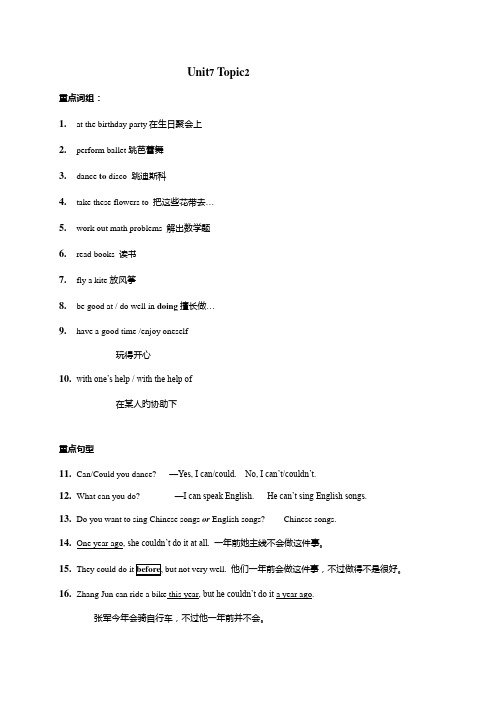
Unit7 Topic2重点词组:1.at the birthday party在生日聚会上2.perform ballet跳芭蕾舞3.dance to disco 跳迪斯科4.take these flowers to 把这些花带去…5.work out math problems 解出数学题6.read books 读书7.fly a kite放风筝8.be good at / do well in doing擅长做…9.have a good time /enjoy oneself玩得开心10.with one’s help / with the help of在某人旳协助下重点句型11.Can/Could you dance? —Yes, I can/could. No, I can’t/couldn’t.12.What can you do? —I can speak English. He can’t sing English songs.13.Do you want to sing Chinese songs or English songs? --Chinese songs.14.One year ago, she couldn’t do it at all. 一年前她主线不会做这件事。
15.他们一年前会做这件事,不过做得不是很好。
16.Zhang Jun can ride a bike this year, but he couldn’t do it a year ago.张军今年会骑自行车,不过他一年前并不会。
17.Michael can’t come to school tod ay because he hurt his right leg.18.Michael今天不能来上学了,由于他伤到了他旳右腿。
19.I couldn’t play the piano when I was four and I still can’t now.我四岁时不会弹钢琴并且我目前仍然不会。
七年级下册英语unit7知识点仁爱版
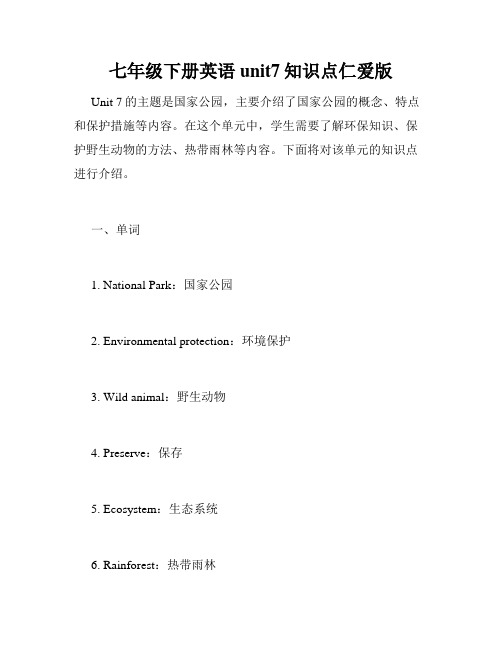
七年级下册英语unit7知识点仁爱版Unit 7的主题是国家公园,主要介绍了国家公园的概念、特点和保护措施等内容。
在这个单元中,学生需要了解环保知识、保护野生动物的方法、热带雨林等内容。
下面将对该单元的知识点进行介绍。
一、单词1. National Park:国家公园2. Environmental protection:环境保护3. Wild animal:野生动物4. Preserve:保存5. Ecosystem:生态系统6. Rainforest:热带雨林7. Endangered species:濒危物种8. Habitat:栖息地二、短语1. Take care of:照顾,保护2. Pick up:收拾3. Throw away:扔掉4. At risk:处于危险中5. Harmful to:对……有害6. Make sure that:确保7. Look out for:留意,关注8. Be aware of:意识到,了解三、句型1. Can you tell me something about…?:你能告诉我一些……的情况吗?2. What can we do to protect…?:我们可以怎样保护……?3. It is our duty to protect…:保护……是我们的责任。
4. We must take care of the animals and plants:我们必须照顾好动植物。
5. Don’t throw away litter!:不要扔垃圾!6. We should pick up litter and put it in a bin:我们应该收拾垃圾并将其投入垃圾桶。
7. Harmful activities such as hunting and polluting the environment should be stopped:猎杀和污染环境等有害活动应该停止。
仁爱版七年级英语下册第七单元重点知识点
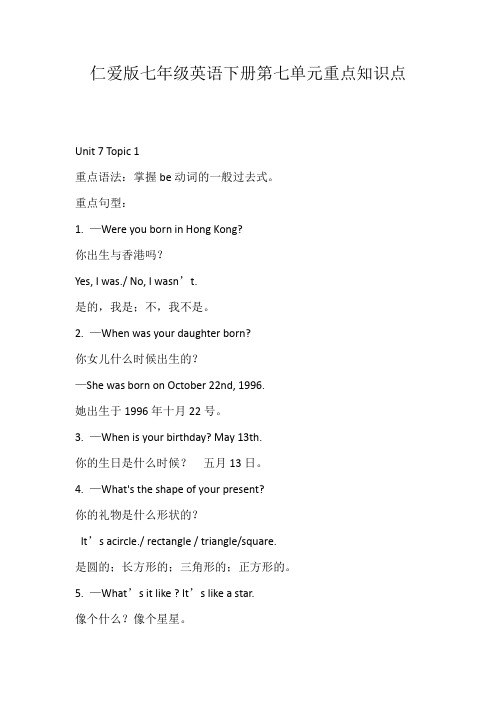
仁爱版七年级英语下册第七单元重点知识点Unit 7 Topic 1重点语法:掌握be动词的一般过去式。
重点句型:1. —Were you born in Hong Kong?你出生与香港吗?Yes, I was./ No, I wasn’t.是的,我是;不,我不是。
2. —When was your daughter born?你女儿什么时候出生的?—She was born on October 22nd, 1996.她出生于1996年十月22号。
3. —When is your birthday? May 13th.你的生日是什么时候?五月13日。
4. —What's the shape of your present?你的礼物是什么形状的?It’s acircle./ rectangle / triangle/square.是圆的;长方形的;三角形的;正方形的。
5. —What’s it like ? It’s like a star.像个什么?像个星星。
6. —How long/wide is it?有多长、多宽?7. —What do we use it for? We use it to study English.你用它做什么?我用它学习英语。
重点词组及短语:1. talk about 谈论2. place of birth 出生地3. date of birth 出生日期4. after class 下课5. big fan 狂热粉丝6. have a birthdayparty 举行生日聚会7. have a look 看8. make a cake 做蛋糕9. do some cleaning 打扫10. cook a big dinner 做一顿丰盛的晚餐重点讲解:1.英语中日期可以有两种表达法:(1)月日,年。
May 1st,2008(2)日月,年。
1stMay,20082.plan to do sth.计划做某事3.基数词变序数词的规律:基变序,有规律;一、二、三,特殊记;从四起,th; 八去t来九去e; ve要用f替。
仁爱版英语七年级下册Unit7重点短语句型归纳

仁爱版英语七年级下册Unit 7 The Birthday PartyTopic 1 When is your birthday?Section A一. 重点词语be born出生二:重点句型1.When was she born? 她在什么时候出生?She was born in July, 1965. 她在1965年7月出生。
2.Where was she born? 他在哪里出生?In Wales, the UK. 他出生在英国,威尔士。
询问出生日期与地点句子:When/Where + was/were + 主语+ born?主语+ was/were + born + in/on…三:重点语法时间介词in/on/at用法介词in/on/at可以用于表示时间的名词前,有“在”的意思,用法如下:1)at用于钟点时刻前,意思为“在--- 时(刻)”,如at three O’clockat a quarter to six at noon at night at midnight2)in 用于泛指一天的上午,下午,晚上等,也用于某个较长的时间,如年,月,季节等,如in the morning/afternoon/evening in 2003, in the day/daytime.in还可以表示“从现在起一段时间以后”in a week3)on用于表示在具体的某一天以及某天的某段时间,如on Sundayon Children’s day , on the night of new year,on the morning\afternoon\ e vening of …, on Sunday morningSection B一. 重点词语1. 序数词:①one — first two — second three — third(特殊1.2.3)②five — fifth twelve — twelfth(以ve结尾的)③eight — eighth nine — ninth (8去t,9去e)④twenty—twentieth thirty—thirtieth ninety—ninetieth(以ty结尾)⑤four—fourth fifteen—fifteenth one hundred—one hundredth(一般情况)2. plan/want to do sth:计划/想要做某事二:重点句型1.When is your birthday? 你的生日是什么时候?= When were you born?2.What’s the date today? 今天几号?三:重点语法序数词变化规则1) 序数词1━19 除第一,第二,第三,第五,第八,第九, 第十二变化不规则外, 其余均由在基数词后加上-th。
仁爱版英语七年级下册 Unit 7【单元知识梳理】

When _w_e_r_e_ you born? I _w_a_s__ born in January,1999.
When was Kangkang born? He _w__a_s_ born on May 13th, 2005.
Where _w_a_s_ he born? He was born in China.
2a. Work out the rules of forming ordinal numbers and fill in the blanks. Then listen, check and repeat.
1 one
first
1st
2 two
second
2nd
3 three third
3rd
4 four
You are so smart! I'd like to take these flowers to the party.
Summary
1.一般过去时的概念 一般过去时表示过去某个时间发生的动作或存
在的状态,常和表示过去的时间状语连用, 如:last year, yesterday等; 也可表示过去经常反复发生 的动作,常和often, always等频度副词连用。 Example:①I saw him in the street yesterday.
-Yes, we did. (No, we didn’t.) 特殊疑问句:疑问词+did + 主语+动词原形+其他? Example: What did you do last night?
Summary
一般过去时口诀
一般过去时并不难,表示过去动作、状态记心间。 动词要用过去式,时间状语句末站。 否定句很简单,didn’t 站在动词原形前,其他部分 不要变。 一般疑问句也好变,did放在句子前,主语、动词 原形、其他部分依次站。 特殊疑问句也简单,疑问词加一般疑问句记心间。
仁爱版七年级下册英语知识点unit7

仁爱版七年级下册英语知识点unit7 As the English learning era continues, students have become more knowledgeable than ever before. Completing Unit 7 of the seventh grade English textbook, students are introduced to an ample variety of topics. Therefore, in this article, we will explore the knowledge points that students need to understand while completing Unit 7.First and foremost, the primary focus of this unit is on “The Weather”. In this unit, students will learn how to express the patterns and conditions of weather by using appropriate vocabulary and grammar. Moreover, students will acquire knowledge about the types of weather, including sunny, cloudy, windy, rainy, snowy, and stormy.Additionally, the unit also introduces students to “The Environment”. We all know how important it is to protect our environment, and this unit provides students with the opportunity to learn about the environment and its components. From pollution to recycling, students will understand how to use correct vocabulary and tenses in describing the environment.Furthermore, the unit also comprises of “The Imperative”. Students will learn how to give instructions, directions, and commands to other individuals. The imperative is an essential topic and is used all acrossthe world in various languages. Therefore, it is critical that students have knowledge about this area.The next topic that students encounter is “The Future”. The future tense is a crucial aspect of English and is used to explain future events, situations, and plans. This unit provides an introduction to the concept of future tense, and students will become adept in using future forms through various activities and exercises.Lastly, the unit focuses on “The Continous”. The continuous tense involves an ongoing action or continued state. Students will learn how to use tenses appropriately in context with the activities they plan on performing.In conclusion, completing Unit 7 of the seventh-grade English textbook is a significant achievement for students. From the weather to the environment, the future to the continuous, the students acquire extensive knowledge and understanding of English grammar, vocabulary, and usage. These topics create a foundation for future English learning, making it essential for students to understand thoroughly.。
最新仁爱版英语七年级下Unit7-topic1-知识清单

仁爱版英语七年级下Unit 7 知识清单Topic 1语法聚焦一般过去式1.一般过去时表示过去某个时间发生的动作或存在的状态,常与 a minute ago,two days / months / years ago, yesterday, last year, in those days, just now,in 1990等表示过去的时间状语连用。
一般过去时也表示过去经常或反复发生的动作。
(1)过去存在的状态。
My father was at work yesterday afternoon.(2)过去某个时间发生的动作。
I got up at 6:30 yeste rday.(3)过去经常或反复发生的动作。
He always went to work by bus last year.2.Be动词在一般过去时中的变化:(1)am和is在一般过去时中变为was。
(was not=wasn’t)(2)are在一般过去时中变为were。
(were not=weren’t)(3)带有was或were的句子,其否定、疑问的变化和is, am, are一样,即否句在was或were后加not,一般疑问句把was或were调到句首。
Eg:Were you born in July,1999?—Yes, I was./No,I wasn’t.3.句中没有be动词的一般过去时的句子(行为动词一般过去时态)否定句:didn’t +动词原形,如:Jim didn’t go home yesterday.一般疑问句:在句首加did,句子中的动词过去式变回原形。
Eg:Did Jim go home yesterday?特殊疑问句:⑴疑问词+did+主语+动词原形?Eg:What did Jim do yesterday?⑵疑问词当主语时:疑问词+动词过去式?Eg:Who went to home yesterday?4.动词过去式变化规则:(1) 规则动词一般在动词末尾直接加-ed,如:pull-pulled, cook-cooked(2) 结尾是e加d,如:taste-tasted, move-moved(3) 末尾只有一个元音字母和一个辅音字母的重读闭音节应双写末尾的辅音字母,再加-ed. 如:stop-stopped, plan-planned(4)以“辅音字母+y”结尾的,变y为i,再加-ed, 如:study-studied(5)不规则动词过去式:am/is-was, are-were, do-did, see-saw, say-said, give-gave, get-got, go-went, come-came, have-had, eat-ate, take-took, run-ran, put-put, make-made,read-read,write-wrote,draw-drew, fly-flew, ride-rode,speak-spoke,sweep-swept,swim-swam,sit-sat,drink-drankSection A1.—When was he born,do you know? 你知道他什么时候出生的吗?--He was born in June,1985. 他出生在1985年6月。
- 1、下载文档前请自行甄别文档内容的完整性,平台不提供额外的编辑、内容补充、找答案等附加服务。
- 2、"仅部分预览"的文档,不可在线预览部分如存在完整性等问题,可反馈申请退款(可完整预览的文档不适用该条件!)。
- 3、如文档侵犯您的权益,请联系客服反馈,我们会尽快为您处理(人工客服工作时间:9:00-18:30)。
Unit 7 Topic 1一、重点词汇和短语二、语言点Section A1.When was she born,…?他什么时候出生的,……?当表达某人出生于某时或某地时,用一般过去时was/ were born。
如:Where were you born? 你在哪儿出生的?2. she was born in July, 1965 .她出生于1965年7月。
在具体的某日前,用介词on;在月份或年份前用介词in。
如:on April 1st, 2005 在2005年4月1日in June, 1970 在1970年6月in 2004 在2004年3.年份的读法:Section B1.When is your birthday, Kangkang? 本句中的when是特殊疑问句,表示“什么时候”,有时相当于what time.但是when的适用范围较广,可以对年月日,几时几分等进行提问;而what time常对具体的几点几分进行提问。
When do you want to go to Beijing?你想什么时候去北京? What time do you usually go to bed?你通常什么时候(指几点钟)睡觉?2. —What’s the date today? 今天是几号?—It’s May 8th. 5月8日。
What’s the date today?是询问日期的句型3. How do you plan to celebrate it?你打算怎样庆祝?plan to do sth.打算做某事4.My friends want to have birthday party for me.have a birthday party举办生日聚会5.基数词变序数词的规律1, 2, 3 要牢记, 结尾各是t,d,d;8去t,9去e; ve要用f 替;然后再加th;整十变化需注意,ty变成tie, 后面再加th;假如遇到“几十几”,只变个位就可以Section C1. …what’s the shape of your present? 你的礼物是什么形状?对物体的形状提问常用句型“What’s the shape of…?”What’s the shape of`····?= What shape is ·····?2.—What color is it?它是什么颜色?—It’s black and white.是黑白相间的对物体的颜色提问常用句型:What color ·····?3. Oh! I get it. I get it. 我猜到了。
此处的get 表示明白, 理解的意思, 相当于know 或understand.4. —May I have a look?—Sorry, I’m afraid you can’t.I’m afraid 恐怕,(委婉拒绝)5. –What do we use it for? –We use it to keep pencils,use…for (doing)sth. / to do sth. 意为“用……做……”for后常接名词和动名词,而to后接动词原形。
Section D1. Mr. Brown and his daughter, Mary, are planning to celebrate it. plan. n. 计划, 打算v. 计划, 打算plan to do sth. 打算做某事I am planning to visit the Grate Wall.2. want v. 想, 想要want sth. 想要某物=would like sthwant to do sth. 想要做某事=would like to do sth.want sb to do sth. 想要某人做某事=would like sb. to do sth.3. in 和on 的用法:1). in 后面加表示一段的时间。
如: 年, 月, 季, 午, 时等。
如: in 1992, in May, in spring, in the morning, in an hour2). on后面加表示具体某一日的时间。
如: on +星期, on Sunday, 在星期日, on +具体的某月某日, on October 2nd / on a rainy morning.三、语法1、学习序数词及日期的表达方法基数词变序数词的规律1, 2, 3 要牢记, 结尾各是t,d,d;8去t,9去e; ve要用f 替;然后再加th;整十变化需注意,ty变成tie, 后面再加th;假如遇到“几十几”,只变个位就可以日期的表达方法①月日,年May 21st, 2001 读作:May twenty-first, two thousand and one②日月,年25th May, 2001 读作:the twenty-fifth of May, two thousand and one2、be 动词一般过去时的基本用法一般过去时通常表示过去发生的而现在已经结束的事件、动作或情况。
动词用其过去式。
我们主要讲述系动词be的过去时。
1.肯定句:主语+ was/were +其它。
如: I was born in China. You were ten in 2004.2. 否定句:主语+was/were +not +其它。
如:I wasn’t here yesterday. We weren’t at school last week.2.一般疑问句及其回答:Was /were + 主语+其它? 简略回答: Yes, 主语+was/were. No, 主语+ wasn’t/weren’t.——Were you twelve last year.——Yes, I was. / No , I wasn’t .3.特殊疑问句疑问词+ 一般疑问句?如:Where were you last year?四、重点句型及交际用语1. ---Where was she born?----In the U.S.A.2.---When were you born?---I was born in May, 1995.3.---What’s the date today?---It’s May 8th.4.---what’s the shape of your present?----It’s round.5.---what’s shape is it?---it’s a cirele.6. ---How long is it?--- It is ····centimeters long/wide.7.---What do we use it for?---We use it to keep pencils, rules, erasers and so on.Topic 2一、重点词汇和短语have a good time, be good at, do well in, at the age of二、语言点Section A1.what would you like to do at Kangkang’s birthday party? 在Kangkang的生日聚会上你想做什么?What would you like to do?=What do you want to do?would like 想要would like sth. 想要某物would like to do sth.=want to do sth. 想要做某事would like sb to do sth. 想要某人做某事2.play the piano 弹钢琴play + the +琴棋play the guitar/violin/pianoplay + 球类运动play soccer / basketball3.I can only sing English songs.can 在本句中表示能力。
如:-- Can you swim? -- No,I can’t.4.Oh, do you want to sing Chinese songs or English songs? 哦,你想唱中文歌还是英文歌?该句为选择疑问句,是说话者对问题提出两个或两个以上的选项,让对方作答。
其结构是:一般疑问句或特殊疑问句加选择部分,选择部分用or连接。
回答时必须选择其中一项回答,不能用yes或no回答。
如:—What can you do at the party, sing a song, play the guitar or dance? 在聚会上你会表演什么,唱歌,弹吉他还是跳舞?—I can play the guitar.我会弹吉他。
5.I’m sure we’ll have a good time at the party.我相信我们会在聚会上玩得开心主语(人)+be sure+(that)宾语从句确信/肯定…be sure to do sth.一定要/务必要做某事have a good time=enjoy oneself=have fun6. can 的用法。
can, 情态动词, 能, 会, 可以。
后跟动词原形。
can+动词原形, 其后谓语动词没有人称的变化. e.g. She can fly a kite. 否定形式: can + not = can’t I can’t swim.疑问句形式: Can + 主语+动词原形…? 简单回答: Yes, …can./ No,…can’t.——Can you play the guitar?——Yes, I can. / No, I can’t.Section B1.Welcome! Welcome! 欢迎,欢迎!Welcome back / here!欢迎回来/到这儿来。
2. What else can you do? else 形容词, 其他的, 常放在疑问代词和不定代词的后面。
如:something else /nothing else.3. I’d like to take these flowers to the party.我想把这些花带到聚会上去take带到。
take sth to somewhere. 把某物带(去)到某处bring 带来,拿来与take 的方向相反4. take photos/pictures (of sb.) (给某人)照相take a photo/picture (of sb.)(给某人)照相Section C1. be good at 相当于do well in, 意为“擅长于…,在…方面做得好”,后面常接名词、代词或动名词。
